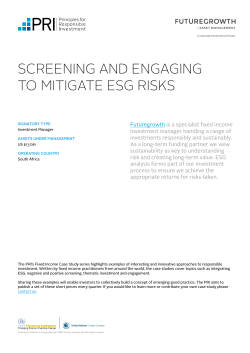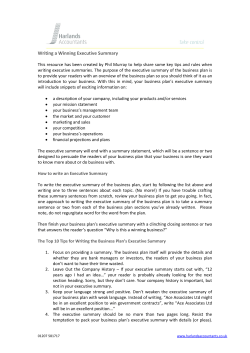
SQUARING THE CIRCLE: HOW TO RECONCILE INVESTMENT PRINCIPLES WITH INVESTMENT ASPIRATIONS
April 2014. Not for distribution outside of the U.S. or to individual investors. SPOTLIGHT: ANALYSIS OF RESPONSIBLE INVESTING By SANDRA CARLISLE, Head of responsible investment SQUARING THE CIRCLE: HOW TO RECONCILE INVESTMENT PRINCIPLES WITH INVESTMENT ASPIRATIONS Financial investment is a complex business for all investors, from pension funds, to institutions, to endowments. Investors should reconcile the need to generate sustainable financial performance and fulfil their fiduciary responsibilities with the desire to invest responsibly to avoid damage to both reputations and returns. Investors have often tried to square this circle by adopting an ethical approach. Ethical investment has a long history in the charities sector that dates back to John Wesley and his Methodist movement,1 and it is an approach that, we observe, is still practised commonly by religious groups. An ethical approach does not have to be simply about religious beliefs: we think it can also work for investors with clear moral principles who want to integrate a core set of investment beliefs into their investment approach. As a result, we see that it has also been favored by investors with diverse mandates, operating across a broad range of industries. However, while not investing in companies and industries that contravene a set of principles may sound easy in theory, in practice it can often prove difficult. Traditional ethically screened funds tend to prohibit investment in companies and industries that ‘mission investors’ seek to avoid but, in fact, will also exclude some where there is in fact no moral objection. A local authority, for example, may want to exclude tobacco and tobacco-related products because of wider public health responsibilities, and a temperance charity may not want to buy brewers. However, both may be happy to invest in nuclear energy as a form of lower-carbon power generation that can help limit the impacts of climate change as 2 Traditional ethically screened funds prohibit investment in companies and industries that ‘mission investors’ seek to avoid, but will also exclude some where there is in fact no moral objection. well as deliver long-term, sustainable and affordable power. Every sector and industry may have ethical pitfalls, and ethically screened funds are not like pick-and-mix sweets; one cannot select only the ethical flavours one likes. As Source: http://www.the-ethical-partnership.co.uk/historyofethicalinvestment.htm illustrated by the example above, an ethical screen may cast its net wider than an investor’s beliefs-based exclusions. Furthermore, beyond a certain threshold, the exclusion of companies for ethical reasons – and some estimates suggest that up to half of all companies in the FTSE100 index could be 1 SPOTLIGHT The fact is that no one knows today what industries may be morally or ethically acceptable tomorrow, and no one knows with certainty which investments will produce a financial return in 20 or 30 years. Before April 2010, BP was perceived as an international oil company that operated safely and with integrity in its upstream business, as well as one making the transition to a lower-carbon, greener business model. Five years on from the Deepwater Horizon Gulf of Mexico spill, BP remains tarred with the legacy of that disaster. excluded on ethical grounds – may, we believe, limit investment opportunities, reduce diversification benefits and cause adverse portfolio performance. An investor may, of course, choose a segregated mandate with specific, bespoke principles-based exclusions. But bespoke exclusions are, we find, no more straightforward to manage than standard exclusions, and they create another challenge: cost. Bespoke mandates are likely to be expensive, and the higher the fees paid to an investment manager to create and monitor bespoke exclusions, the higher the risk that an investor will not generate the required financial return it needs to support its core financial aims. While ethical screening offers a solution, it can be costly and complex, and it is not failsafe. Furthermore, we see that it is not always the obvious ‘sin stocks’ that can cause financial and reputational damage. One of the most spectacular and early failures of the financial crisis in the UK was Northern Rock, a company whose simple business model was perceived by many investors as low-risk, given its focus on the UK mortgage market, and as socially useful in broadening access to home ownership. Similarly, before April 2010, BP was considered as an international oil company that operated safely and with integrity in its upstream business, as well as one making the transition to a lower-carbon, greener business model. Five years on from the Deepwater Horizon Gulf of Mexico spill, BP remains tarred with the legacy of that disaster. More recently, following garment factory fires in Bangladesh, the real cost of cheap clothing has become very apparent to customers and 2 SPOTLIGHT Companies that are managed responsibly and sustainably in the interests of all stakeholders are likely to do better, retain loyal employees and satisfied customers, avoid scandals, and create long-term value for their shareholders. That is why we contend that responsible investment is better investment. Following garment factory fires in Bangladesh, the real cost of cheap clothing has become very apparent to customers and investors. investors. Many clothing companies that used these suppliers would in all likelihood have passed ethical screens, and clothing retail has generally been seen, from an ethical standpoint, as a relatively low-risk business. The fact is that no one knows today what industries may be morally or ethically acceptable tomorrow, and no one knows with certainty which investments will produce a financial return in 20 or 30 years. and governance (ESG) concerns. A responsible investment approach enables investors to consider a broader range of issues than those included in traditional financial analysis. In considering ESG factors as an integral part of the investment process, we believe responsible investment offers a more holistic view of company valuation or, to put it another way, it takes a ‘bigger picture’. If there are no easy moral or financial answers, and exclusion is more complex than it first seems, what alternative approaches exist? Can investors find a solution that will allow them to harmonize the seemingly irreconcilable imperatives of reasonable risk-adjusted financial returns and principled investment beliefs? Responsible investment and ESG integration can be used in both passive and active investment approaches. In the former, a manager might track an index such as the FTSE4Good or the Dow Jones Sustainability™ Indices. An active manager will seek to beat market returns through active stock selection. As an active manager with a long-standing commitment to ESG integration within its investment process, Newton believes that responsibly managed companies are better placed to achieve sustainable competitive advantage and long-term growth. We think responsible investment offers just such an alternative approach. It can complement ethical screening and help reconcile the need to generate long-term financial returns with environmental, social, ESG issues range from traditional corporate governance matters of board composition, pay and ownership to the sustainability of social and environmental issues, including human rights, labor standards, carbon emissions and water use. Responsible investment considers ESG issues to be financially material because poor ESG management (or ESG mismanagement) can lead to operational, business and financial risk. A company that manages its environmental impacts so badly that it causes massive spillage or wide-scale pollution is very likely to suffer financial loss both through fines and lawsuits, and its investors would suffer from a consequent falling share price. The board and senior management teams would probably have to spend valuable time solving past problems instead of setting the company up for future growth. The company’s intangible value is also likely to take a hit: brand reputation, once lost, is tough to earn back, which can have implications for attracting and retaining talented employees. We believe a responsible investment approach is not, however, just about good risk management, or predicting and avoiding the next company disaster. It is a positive approach to investment that recognises the links between ESG factors and company performance. It acknowledges that companies that are managed responsibly and sustainably in the interests of all stakeholders are likely to do better, retain loyal employees and satisfied customers, avoid scandals, and create long-term value for their shareholders. That is why we contend that responsible investment is better investment. 3 PERFORMANCE: IMPORTANT INFORMATION This is a financial promotion. The opinions expressed in this document are those of Newton and should not be construed as investment advice. This document is for institutional investors only. Past performance is not a guide to future performance. The value of investments and the income from them can fall as well as rise and investors may not get back the original amount invested. Past or current yields are not indicative of future yields. Any reference to a specific country or sector should not be construed as a recommendation to buy or sell this country or sector. Please note that portfolio holdings and positioning are subject to change without notice. ‘Newton’ refers to the following group of affiliated companies: Newton Investment Management Limited, Newton Capital Management Limited and Newton Capital Management LLC. NCM LLC personnel are supervised persons of NCM Ltd and NCM LLC does not provide investment advice, all of which is conducted by NCM Ltd. Except for Newton Capital Management LLC and Newton Capital Management Limited, none of the other Newton companies offer services in the U.S. Newton Capital Management Limited (NCM) is an investment management firm, in the UK NCM is authorized and regulated by the Financial Conduct Authority in the conduct of investment business and is a wholly owned subsidiary of The Bank of New York Mellon Corporation. Registered in England no. 2675952. Newton Capital Management Limited is registered as an investment adviser under the Investment Advisers Act of 1940. @NewtonIM newtoncapitalmanagement.com 4
© Copyright 2025





















